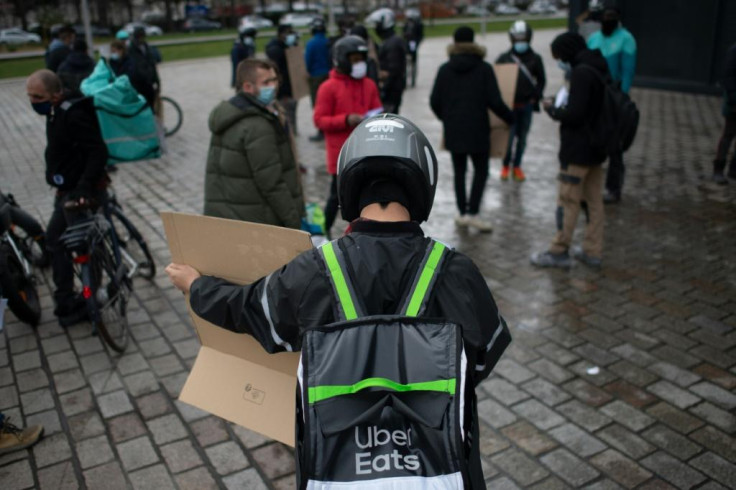Gig Economy Workers Could Receive Pay Safety Net, Injury Insurance Under New Legislation

Australia's food delivery drivers and parcel couriers are poised to gain minimum employment standards, including superannuation and injury insurance, as a new legislative reform takes effect.
The Transport Workers Union (TWU) has tendered an application to the Fair Work Commission to mandate safety net payments, superannuation, and injury assistance for independent contractors, so they can cover their weekly costs, The Guardian reported. This includes self-employed gig-economy drivers for companies like Uber Eats, Menulog, DoorDash, and Hungry Panda.
The TWU application coincided with the union workers' protest on Wednesday, demanding better wages and working conditions for truck drivers, food delivery drivers, and parcel couriers.
Demonstrators gathered outside the Fair Work Commission office, and spoke about their struggles as gig-economy drivers to make ends meet.
"We don't have any personal leave, we don't have any sick leave, we don't get any loadings, we don't have any entitlements, we don't get any breaks," delivery driver Utsav Bhattarai told reporters in Sydney.
The protesters demanded regulatory changes to protect the rights of around 500,000 workers considering the uncertain nature of their jobs, AAP reported.
“I have faced every issue working on food delivery apps, I’ve been underpaid, harassed, deactivated. Today is such an important day and I’m so proud that everyone here has fought so hard for these new laws and these new standards.” - Utsav Bhattarai pic.twitter.com/WgyfLLUtDi
— TWU Australia (@TWUAus) August 28, 2024
The TWU's applications to the Fair Work Commission also sought fairer pay for transport supply chain workers, including parcel delivery drivers for companies like Aramex and CouriersPlease.
These landmark applications mark a significant milestone, as they are the first to be submitted under recent employment law reforms that grant gig workers and owner-drivers the right to seek assistance from the commission. The application was submitted after the Fair Work Commission appointed a panel to ensure the transport system was "safe, sustainable and viable."
The minister for employment and workplace relations, Murray Watt, told reporters at the launch of the reforms that, "The commission's new powers will ensure gig workers, such as those in rideshare, food delivery and care work, no longer fall through the cracks ... Rideshare and food delivery workers shouldn't have to choose between safety and getting paid."
In the past decade, about 486 transport workers have died while on the job, and more than 1,700 people have died in truck crashes.
"We share the roads with trucks, courier vans and food delivery bikes every day. With the boom of online retail and food delivery, consumers have come to expect rapid deliveries to our doors, but also expect that drivers are paid properly and work under safe conditions. Until now, that has not been the case," said Michael Kaine, national secretary of the TWU. "Over time, these standards can be built up and expanded out until we have eradicated the 'Amazon effect' that has brought deadly exploitation and unsustainable competition to the transport industry."
© Copyright 2025 IBTimes AU. All rights reserved.





















